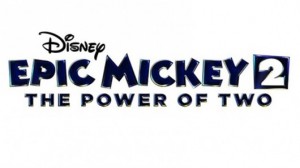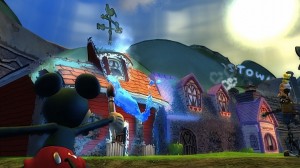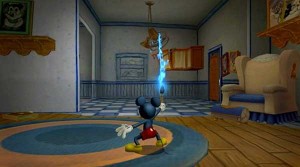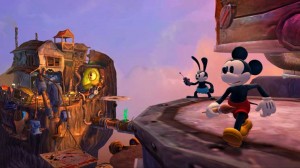[Nintendo Everything Interview] – “Junction Point’s Paul Weaver explains why Epic Mickey is so magical”, and other magical discussions

–
I just now realized that I’ve interviewed this guy before. It was way back in November of 2010, just before the first ‘Epic Mickey’ launched. I asked him if an ‘Epic Mickey’ game would land on 3DS in the future, and he told me that it was “too early to say”.
I wonder if he was lying and they had actually already planned out Power of Illusion…
So, there I was once again, sitting in my imaginary room waiting to imaginarily interview someone, pretending it was in-person instead of via email. The subject this time around? Mr. Paul Weaver from Junction Point. I’ve actually interviewed Paul before, but it was so long ago that I wasn’t even doing this “pretend I’m interviewing them live” thing. It was just straight Q&A, IGN-style.
Boring, am I rig–
Before I could finish the thought, Paul entered the room. I was pretty excited to get the chance to talk to him– primarily because I had gotten such pleasure out of playing Junction Point’s last game, “Epic Mickey”– and I didn’t waste too much time with formalities before getting right into the hard-ball, tough-as-nails questions about how amazing I think their games are:

–
“Hi Paul,” I said, “Disney Epic Mickey was one of my personal favorite platformers of last gen, largely due to its immersive, almost Banjo-Kazooie-like atmosphere.”
He seemed surprised that I had started before he actually sat down, but the setup definitely got his attention– his expression lit up, and I knew I was “in” before saying (typing) my first question mark,
“In terms of the “feel” (art, music, etc), will Disney Epic Mickey 2 stay the same?”
He didn’t waste a moment thinking about it,
“Absolutely!” he said, taking a seat across from me, “I actually started my career at Rare and was lucky enough to work alongside the Banjo-Kazooie team while helping to work on the Donkey Kong Country series. They have remained an influence for me and I’m very happy to see the comparison drawn to Disney Epic Mickey, so thank you!”
“You’re welcome.” I pretended to say post-email.
“For Disney Epic Mickey 2: The Power of Two,” he continued, “you can expect to see an even bigger, broader world to explore this time and of course this time you get the opportunity to play the game co-operatively, so more than one person can enjoy the sights and sounds of Wasteland together!”
“How tough is the research for this game though? I know Disney Epic Mickey required hours upon hours of research into old Disney cartoons and characters, but I’d imagine you’ve already used up most of the easy-to-learn-about characters, making it even harder this time around.”
“Hmm…” he thought for a moment, “Tough is probably the wrong word as we all enjoy our work so much – it’s actually fun!”
“Fair point,” I rebutted, “But what about in terms of the time it takes to research your game?”
“Now, in terms of the time it takes to research our game… that’s a different story…
“There are hundreds of props and set pieces in the game and each one is inspired by something from Disney, be it the park, a movie, cartoon, comic, ride or toy… and there are thousands that we have looked at and considered. This has given us a very large reference library to lean on; so much so that we could actually keep making Disney Epic Mickey adventures for the next decade at least!”
This was easily the best news I’d received all day. Like I’ve said in the past, Epic Mickey is the only exploration platformer– akin to Mario 64 or Banjo Kazooie– that we’ve really had recently. It’s a genre criminally underexplored, but we are undeniably lucky that the one foray into it we’ve had in the last few years captured the magic so perfectly.

–
But what makes that magic? I know some people call it the “Nintendo difference”, but other companies (namely Rare, *cough*) have managed to include such an indescribable feeling in their games as well, Junction Point included. How do they do it though? What IS the “magic”?
“Disney Epic Mickey is a fairly lighthearted series at first glance, but the atmosphere of the first game had something oddly dark and nostalgic about it in the best of ways. If you were talking to upstart developers in five years and they asked how to achieve this atmospheric feel, what would you tell them?”
“I think my advice (and this applies to anything you work on) is that you have to find your passion and live and breathe it. I got married in 1997 and Mickey and Minnie were on our wedding cake. I have loved Disney my entire life and to get the opportunity to work on Disney Epic Mickey was a dream come true. From the day we started on the project we lived in the history of what we were doing; watching old cartoons, visiting the parks regularly, talking to the legends in Feature Animation and exploring Disney’s archives and speaking to its curators. In short, we immersed ourselves in the world and became subject matter experts. But… you can do all of this research and understand the history and still fail – if you don’t love what you do, it won’t come through in the final project.”
Could it be that simple? Is “magic” really just natural when you love what you do and immerse yourself within it?
>Segue about the Nintendo Wii being underpowered.<
“You’re developing Disney Epic Mickey 2 on Wii first and foremost, and then porting it to the other consoles (PS360, Wii U). Does this pose any limitations, or is it as the first game where everything works as you want it to?”
For a second I thought I had Paul in a bit of a bind– he could hardly say that a console he was developing for was terribly underpowered and limited, but could he really claim that what they’re doing with Epic Mickey is unprecedented?
“I feel what we’ve done with Disney Epic Mickey 2 is unprecedented,”
Oh.
Well uh.
Okay.
He continued,
“The development team at Junction Point led development on the Nintendo Wii and have strived to make the highest quality game possible; with the launch of the Wii U this year, we want to be known as “the last great game on the Nintendo Wii” and we believe we’ve achieved that. For the 360 and PS3 versions, they weren’t a simple port, however. We co-developed the game and upgraded all of the content (so yes, that’s all of the audio, including the music, sound effects and songs, as well as all of the artwork) to make the game as good as it can be on the PlayStation 3 and XBOX 360. If that wasn’t enough, we’ve also added some really cool unique features to those consoles… more on that later ;)”
Paul is a tease, it turns out. Good thing this is a Nintendo website where we aren’t concerned about PS360 stuff! Take that, Paul!
“Conversely,” I said, “do you find some aspects of the Wii’s control scheme to be somewhat ‘freeing’ as a developer?”
“I’m a big fan of motion control, and kudos to all of the hardware manufacturers in the course of the last few years in moving in this direction. What Nintendo did with the Wii was re-introduce video games to a mass audience and lower the “barrier to entry” that was putting a lot of people off from playing (and most importantly enjoying) video games.
“For the Nintendo Wii, we decided that we would make use of every feature that the controls have in the first game and pulled that off successfully in Disney Epic Mickey. For Disney Epic Mickey 2: The Power of Two, we’ve concentrated on a control scheme that would also work well with the PlayStation 3 and XBOX 360 controllers and this is where we’ve spent most of our time. I believe the teams have done an excellent job in making the game feel great to play on every platform.”
By this point he had almost sold me on the game. There was, however, just one small caveat…
“I’m hesitant about voice acting.” I laid it out plain and simple, “There’s something really cool and magical about a lack thereof, so when I heard that Disney Epic Mickey 2 would switch to voice acting I was a bit apprehensive. As though they decided to include voice acting in Zelda or LEGO games (which they did!). Can you sell me on it?”
“Well,” he began what would surely be a lengthy answer, “you mentioned Banjo Kazooie earlier and between that game, Zelda and the LEGO series, they influenced our main decision in Disney Epic Mickey to go with “nonsense voice” for the characters. This worked really well from a retro feel standpoint. However, upon completion, we realized we had fallen short in making the game as magical as it could be. Telling a story in a video game is a tough job and we covered a lot of ground in the first game with an adventure that took around 25 hours to complete… That ended up being a lot of reading! When we looked back and thought about how it would have sounded to hear Mickey, Captain Hook, the Petes, as well as ‘what would Oswald sound like? Gus?’ we knew we had to add character voices in the sequel. A lot of these characters are like old friends; to hear them in this world only adds to the experience… if that wasn’t enough for us, we then went “all in” and added singing to the game too, which takes the Disney experience to a whole new level.”

–
I’d like to say that this totally put my fears to rest, but unfortunately I’m still in the “nonsense voice boat”. I trust Junction Point to make a good game– after all, they’ve yet to let us down– but… it’s tough for me to be convinced. Maybe I’m too old scho–
Whoa, I’m supposed to be doing an interview. I shook my head a bit and popped back into the opposite-hot-seat:
“Two more!” I exclaimed,
“Keep em coming!” he exclaimed back at me.
“Okay!” I exclaimed back at him, “Do you ever plan to break away from working with Disney franchises to pursue something more purely original?”
“We’ve all had the opportunity to work on original products in the past and would definitely consider it sometime in the future, but right now we’re having too much fun in the World of Wasteland!”
He didn’t exclaim this answer and it certainly didn’t strike me as PR ambiguity. I would trust them on this– expect only Epic Mickey from them for a while now.
“My last question is one I’ve been meaning to ask an artistic developer like yourselves for quite some time, and it’s a long one that requires a bit of “setting the scene”.”
This was a doozy of a question, but I had to get it off my chest. I was too curious to simply let it slide:
“It seems that no matter how “unrealistic” a game gets, how simple the textures are, or how “childish” the concept, one thing that all designers– particularly on PS3 and Xbox 360– continuously use are the lighting and particle effects to their full extent. LittleBigPlanet, despite being no more realistic or childish than Mario, has detailed textures, great lighting, realistic physics, and top-notch effects. Ratchet and Clank, another such series, is near-Pixar quality when it comes to the number of pixels on the screen and the hairs you can count on any given character’s head.”
He seemed to be following me so far, if a bit confused,
“My question for you:”
I paused for dramatic effect. We both held our breath. I think. (Which is a feat given there was about a week in between me asking this and the answer)
“Is this necessary? Must we always use a system to its full extent when developing certain games? Why is it not “okay” to portray an unrealistic world unrealistically?”
“There has been a drive forward over the course of the last decade to give consoles way more “horsepower” in terms of their hardware and this translates directly to the quality of the visuals that you can put on the screen.” he immediately responded, “There’s nothing inherently “wrong” with that. The counter question is this – amidst all of the amazing visuals and fantastic 7.1 surround sound, do you as the player actually feel like you’re part of the world you’re adventuring in? Do you feel any emotion towards the characters in the world? Is the storyline of the game pulling you in and making you want to explore further? If you answered no to any of those important questions, then you’re probably not having that much fun in the game, or at least you don’t feel invested in it.
“I do believe visuals are important; the “wow” factor of what you see is clearly the first impression of any game, movie, cartoon or comic… but it’s not where the soul of a game lies. As developers we have to put that same amount of effort into all aspects of a game, so it looks amazing, sounds fantastic, has great gameplay and has an engaging story that pulls you into the world. Only then do you get something special.”
And with that, I had nothing more to ask. I simply stood up, nodded, turned around, walked away, turned back around, sat down, and said
“Thank you for taking the time to answer my questions! It’s a real pleasure to be able to communicate with developers, especially when they’re people whose products I enjoy deeply.”
“You’re very welcome!” he responded, “Thank you for your very thoughtful questions!”
~ ~ ~ ~ ~ ~ ~ ~ ~ ~ ~ ~ ~ ~ ~
And that’s that. Another week, another interview survived. Tune in next week for “Austin tackles Playboy– an interview with Miss October about games, life, and games. Mostly games though. In fact, it’s entirely about games.”

–